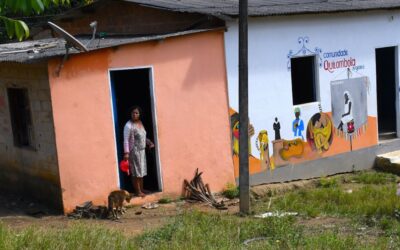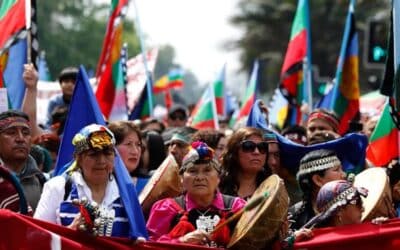Statement from Civil Society Organizations on the Launch of the Tropical Forests Forever Fund (TFFF)
Belém, November 2025
Brazilian, Amazonian, Asian, African and international civil society organizations, gathered on the occasion of COP 30, express their deep concern and rejection of the launch of the Fund for Tropical Forests Forever (TFFF), announced by the Conference Presidency, for the following reasons:
- The TFFF mistakenly and misleadingly considers deforestation a market failure that will be resolved by putting a price on the ecosystem services of tropical forests to attract private investment. The ecological collapse caused by capitalism will not be solved with more capitalism.
- The TFFF does not recognize forests as living systems that have the rights to life, to preserve their life cycles, to maintain their capacity for regeneration, to not be polluted, to conserve their integrity, and to demand timely remediation and restoration.
- The TFFF does not seek to address the true structural causes of forest destruction. It does not propose effective measures to curb and reverse agricultural, mining, and hydrocarbon extraction, nor the expansion of mega-infrastructure projects.
- The TFFF will operate like any commercial bank: obtaining loans of $125 billion at an interest rate of approximately 4%, and lending that money at a rate of approximately 7%. From the difference between these interest rates, it intends to generate $4 billion annually to distribute $4 per hectare of standing forest to the governments of the countries where 1 billion hectares of tropical forests are located.
- The TFFF is a mechanism for privatizing forest finance. If only 1% of the $2.7 trillion in public funds spent on defense budgets worldwide were allocated, $27 billion could be made available annually. That’s more than six times the $4 billion per year that the TFFF would generate based on unsafe stock markets!
- The TFFF does not prioritize indigenous peoples and local communities, nor does it establish gender and intergenerational equity in the allocation of resources. 80% of the $4 per hectare will go to national governments, while only 20% (80 cents) will go to those who actually defend and preserve tropical forests.
- The TFFF is not a mechanism that originated in the Global South, nor was it built from the ground up with the participation of forest peoples. The idea for this mechanism of financializing nature was conceived more than 15 years ago at the World Bank – thus it is NOT a South led mechanism.
- The World Bank will have significant influence over the TFFF. The wealthy countries that sponsor this mechanism will hold a majority on its board. Developing countries and civil society will have no decision-making power in the governance of the TFFF.
- The TFFF’s profitability is not guaranteed, and in the event of a decline in profits, payments will be made first to the fund’s managers and consultants, then to private investors, then to the sponsoring wealthy countries, and finally to the countries with tropical forests. Therefore, while there is a possibility of supporting traditional peoples and communities, the amount of resources is neither assured nor sufficient.
- The TFFF is the twin of carbon markets like REDD+ (Reducing Emissions from Deforestation and Forest Degradation +). They are not identical, but both are false solutions that respond to market logic, they are greenwashing mechanisms destined for private investors polluters, and are a distraction from the effective fight against deforestation.
In contrast to the TFFF, the undersigned call for the construction of effective mechanisms against deforestation that:
-
Address the structural causes of deforestation.
-
Establishes effective actions for forest recovery and restoration.
-
Are sufficient, directly accessible without intermediaries, and come from public funds, such as those allocated to defense budgets and fossil fuel subsidies.
-
Are reliable and not dependent on stock market fluctuations.
-
Are primarily directed toward Indigenous Peoples, local communities, and populations that conserve forests.
-
Strengthen community management and conservation mechanisms to build territories and municipalities free from deforestation, extractivism and violence against women.
-
Include governing bodies where Indigenous Peoples and local community organizations have real decision-making power.
-
Recognize Forests, Rivers, and Nature as subjects of rights and implement effective measures to guarantee their rights.
Signature form: https://forms.gle/RaaD3Wti9KhJuUuR6
SIgnatories
1. Global Forest Coalition (GFC) – International
2. Rede de Trabalho Amazônico (GTA) – Brasil
3. Asamblea Mundial por la Amazonía (AMA)
4. Global Alliance for the Rights of Nature (GARN) – International
5. Movilización de los Pueblos por la Tierra y el clima – Internacional
6. Foro Social Panamazónico (FOSPA) – Panamazonía
7. Red Iglesias y Minería – Brasil
8. Committee for the Abolition of Illegitimate Debt (CADTM) – Internacional
9. Centre pour la Justice Environnementale – Togo, Africa
10. Fundación Solón – Bolivia
11. WALHI/Friends of the Earth Indonesia – Indonesia
12. World Rainforest Movement (WRM) – International
13. Friends of the Earth International (FOEI) – International
14. Fridays For Future International – International
15. 350. org – Brasil
16. Corporate Accountability – Internacional
17. Indigenous Environmental Network International
18. Associação Alternativa Terrazul – Brasil
19. Associação dos Povos Indígenas do Rio Anebá (APIRA) – Brasil
20. Fórum Carajás – Brasil
21. Teia Carta da Terra Brasil – Brasil
22. JUPIC – SSpS – Brasil
23. Coletivo Campesino Amazônico de Pesquisadores Amazônidas – Brasil
24. SAF-05 Sindicato da Agricultura Familiar-CUTIAS-AP Norte Brasil
25. Comissão Episcopal Regional para Ecologia Integral e Mineração – Brasil/Estado de Minas Gerais
26. Comunidades Eclesiales de Base de Catamarca – Argentina
27. Ação Franciscana de Ecologia e Solidariedade AFES – Brasil
28. Comissão para Ecologia Integral e Mineração da CNBB – Brasil
29. Associaçao de Defesa dos Direitos Humanos e Meio Ambiente na Amazônia (ADHMA) – Brasil/Amazonia
30. UFRJ – Brasil
31. Cosmopolíticas -Brasil/Internacional
32. GARN Indigenous Council – United States
33. Buen Vivir – Costa Rica
34. Centro di Volontariato Internazionale (CeVI) – Itália
35. FDACMA – Brasil
36. GTA Regional Alto Solimões – Brasil
37. Instituto Socioambiental Casa Amazônia – Brasil
38. Conselho Indigenista Missionário (CIMI) – Brasil
39. CADTM – México
40. Attac Argentina
41. II Encuentro Ecosocialista Latinoamericano y Caribeño
42. Associação Comunitária de Educação em Saúde e Agricultura – Brasil
43. ProBios – Suriname
44. FOSPA – Suriname
45. Federacion De Pueblos Indigenas Kechwa Chazuta Amazonia-Fepikechaepikecha – Perú
46. International Rights of Nature Tribunal
47. Rede brasileira Ecossocialista – Brasil
48. CADTM, AYNA – América Latina y Caribe
49. Rede Brasileira de Ecossocialistas (RBE) – Brasil
50. Irmãs de jesus Bom pastor – Brasil, sul
51. Associação comunitária morro do pilar – Brasil
52. Los derechos de los bosques Brasilia – Brasil
53. Pakistan Fisherfolk Forum – Pakistan
54. EcoEquity – US
55. Coletivo Empatia Clarifranciscana – Brasil
56. Corrente Socialista dos Trabalhadores e Trabalhadoras – Brasil
57. Cimi Sul Paraná – Brasil
58. Não ao TFFF – Brasil
59. Groupe écosocialiste de SolidaritéS – Suiza
60. Equipe de Comunicação SSpS – Brasil
61. Colectivo de Coordinacion de Acciones Socio Ambientales (Colectivo CASA) – Bolivia
62. Campaña Que Paguen Los Contaminadores América Latina – Regional América Latina y el Caribe
63. Plataforma Latinoamericana y del Caribe por la Justicia Climática
64. Centro de Derechos Económicos y Sociales – Ecuador
65. Colectivo VientoSur – Chile
66. Climáximo – Portugal
67. Rede de Mulheres Ambientalistas da América Latina – Brasil
68. Fundación Abril – Bolivia
69. Grupo de Estudos em Educação e Meio Ambiente do Rio de Janeiro (GEEMA) – Brasil
70. Rede Brasileira de Educação Ambiental (REBEA) – Brasil
71. Rede de Educação Ambiental e Políticas Públicas (REAPOP) – Brasil
72. Global Justice Ecolocy Project – International
73. Shifting Advocacy – Germany
74. Earth Thrive – Serbia/UK/International
75. Balkan Centre for the Rights of Nature – Balkans
76. Protect the Forest – Sweden
77. Climate Communications Coalition – USA
78. Salvaginas Colectiva Ecofeminista – Bolivia
79. Colectivo Jna Tsjo – Mexico
80. Centro de Estudios Superiores Universitarios – Universidad Mayor de San Simón (CESU-UMSS) – Bolivia
81. Yakutantanaku – Bolivia
82. Heartwood – USA
83. Rede Popular De Direitos Humanos De Rondônia (REPODH-RO) Brasil
84. Articulación FOSPA Bolivia
85. Organización de los Pueblos Indígenas de la Amazonia Colombiana (OPIAC) – Colombia
86. Grupo de Estudios Interdisciplinares en Política, Administración y Derechos – Colombia
87. Instituto Cordillheira – Brasil
88. Ei polteta tulevaisuutta – Finland
89. Conselho geral da tribo Ticuna – Brasil
90. Grupo de Trabajo de Recursos Hídricos de la Provincia de Ilo – Perú
91. Instituto Trinitas – Brasil
92. Asociación Latinoamericana de Educación Radiofónica (ALER) – Ecuador
93. Missionárias Servas do Espírito Santo – Brasil
94. Rede de Solidariedade (REDES) – Brasil
95. FASE Solidariedade e Educação – Brasil
96. Congregação do Preciosíssimo Sangue – Brasil
97. Serva Do Espírito Santo – Brasil
98. Missionaria Servas do Espirito – Internasional
99. Friends of Bell Smith Springs – USA
100. Associação Comunitária de Remanescente de Quilombo de Brasil (ASCORQUIR)
101. Associação Dos Produtores Rurais De Agricultura Familiar Do Entorno De Palmas Tocantins (APRAFEP – TO) – Brasil
102. Instituto Arte Afro e Direitos Humanos Região Norte – Brasil
103. Institute for Research & Advocacy of Borneo (LinkAR Borneo) – Indonesia
104. Movimento Esquerda Socialista (MES-PSOL) – Brasil
105. Observatori del Deute en la Globalització – Catalunya, España
106. Colectiva Consumidores Conscientes – Bolivia
107. Bolivia Libre de Transgénicos – Bolivia
108. Standing Trees – United States
109. Jumu’eha renda keruhu – Centro de Formação Saberes Ka’apor – Maranhão Brasil
110. Tuxa ta Pame – Conselho de Gestao Ka’apor – Brasil
111. Movimento das Mulheres Negras da Floresta/Dandara – Brasil, Amazonas
112. Colônia de Pescadores Z-2/Ro Guajará Mirim – Brasil
113. Colectivo Voces Ecológicas (COVEC) – Panamá
114. Instituto Madeira Vivo – Brasil, Amazonia
115. Comitê Defensor da Vida Amazonica en la Cuenca del Rio Madeira Rondônia e Guajara Mirim – Brasil
116. Coletivo Indigena Mura de Porto Velho – Brasil, Rondonia, Amazônia
117. Articulação de Mulheres Brasileiras (AMB) – Brasil
118. Plataforma para la Gobernanza Responsable de la Tierrac – Perú
119. Fórum de Mulheres da Amazonia Paraense (FMAP) – Brasil
120. Collettivo FocusPuller – Italy
121. ICDS BRASIL Comunidade Internacional de Leigos Salvatorianos – Internacional, região Brasil
122. A Sud – Italia
123. Missionárias Servas do Espírito Santo – Timor Leste
124. Centro de Integração do migrante – SP Brasil
125. Sindicato de Obreros del Campo Andaluz – Sindicato Andaluz de Trabajadores/as Andalucía (SOC-SAT Andalucía) – Europa-Internaciinal
126. Central Sindical Única de Trabajadores Campesinos de Guayaramerín – Bolivia
127. Amazônia na Rua Recife – Brasil
128. Ciencia y Chamanismo – USA
129. Espacio de Reflexión y Cooperación (ECORE) – Honduras
130. Pacto Ecosocial e Intercultural del Sur – Internacional
131. Defensoras de la Vida y de la Pachamama – Peru
132. Comissão ecologica Tocantinia – Brasil
133. Global Tapestry of Alternatives – International
134. Red de Acción por los Derechos Ambientales (RADA) – Chile
135. Instituto Universidade Popular (UNIPOP) – Brasil
136. Heartwood – USA
137. MARBE SA – Costa Rica
138. Rede Brasileira de Ecossocialistas – Brasil
139. Coletivo Juntos – Brasil
140. Rede Emancipa de Educação Popular – Brasil
141. Instituto Popular de Capacitación (IPC) – Colombia
142. Setorial Ecossocialista PSOL RS – Rio Grande do SUL, Brasil
143. Frente Ambientalista do Vale do Paraíba – Taubaté, São Paulo, Brasil
144. Himalayan Alliance for Water and Agriculture HAWA – Nepal
145. Plataforma Boliviana de Acción frente al Cambio Climático (PBACC) – Bolivia
146. Sahabat Alam Malaysia (Friends of the Earth Malaysia) – Malaysia
147. Asociación Agropecuaria MISHKI MALLIY, Comunidad Nativa de Pawana Anak Nauta – Región San Martín – Perú
148. Attac France – France
149. É.D.EN. GUYANE – Guyane française
150. Care About Climate – International




